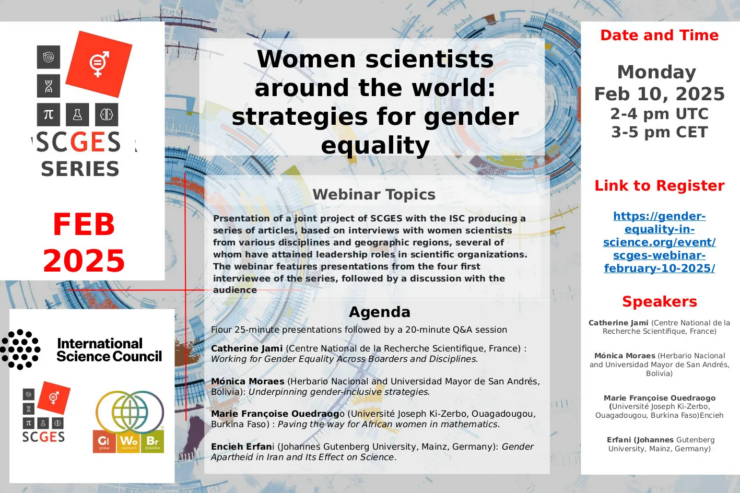We would like to point out on the online webinar held by the Standing Committee for Gender Equality in Science (SCGES) on the 10th of february at 2 pm UTC.
This webinar is organized jointly with the International Science Council (ISC)
Topic: Women scientists around the world: strategies for gender equality
“Women scientists around the world: strategies for gender equality”, is a joint project of SCGES with the ISC producing a series of articles, based on interviews with women scientists from various disciplines and geographic regions, several of whom have attained leadership roles in scientific organizations. It explores the drivers and barriers to gender representation in scientific organizations, aiming to document from a qualitative point of view the obstacles to gender equality in science, and the strategies developed to reach it. The webinar features presentations from the four first interviewee of the series, followed by a discussion with the audience.
Please fill in the registration form to access the Webinar.
Agenda
Four 25-minute presentations followed by a 20-minute Q&A session
Speakers, titles and abstracts:
- Catherine Jami (Centre National de la Recherche Scientifique, France) : Working for Gender Equality Across Boarders and Disciplines. My higher education in mathematics started with a harsh experience of sexist harassment. But it is also through my research experience as a historian of science that I became aware of the importance of making the voices of all those who contribute to the advancement of knowledge around the world heard. This has led me to act to bring together scientists who, across disciplines, are working to foster gender equality in science.
- Mónica Moraes (Herbario Nacional and Universidad Mayor de San Andrés, Bolivia): Underpinning gender-inclusive strategies. In my professional career I have not faced an environment of gender discrimination. The only time I suspected there was a difference because I am a woman was when I was nominated to join as full academician in the Bolivian Academy of Sciences. I was not accepted immediately, it took several years before I was admitted. Then I managed to create the gender commission and afterward an award to recognise Bolivian women scientists. When I took over the presidency as the first woman, I reached a consensus for several changes in institutional practices in the Academy and that meant a great effort to get documents approved in their final version.
- Marie Françoise Ouedraogo (Université Joseph Ki-Zerbo, Ouagadougou, Burkina Faso) : Paving the way for African women in mathematics. In Burkina Faso, the discrimination I suffered in my studies and my career is mainly linked to the socio-cultural barriers that still exist and that somewhat define the place of women and men in the society. Also, the isolation of African women mathematicians led us to the creation of AWMA (Association for Women in Mathematics in Africa) and develop strategies to solve these problems.
- Encieh Erfani (Johannes Gutenberg University, Mainz, Germany): Gender Apartheid in Iran and Its Effect on Science. Gender apartheid in Iran significantly impedes the advancement of science and technology by systematically marginalizing women and depriving the country of immense intellectual potential. Talented female scientists face numerous barriers, including limited participation, underrepresentation in leadership, and restricted resource access. This inequality, coupled with the brain drain of skilled women seeking opportunities abroad, weakens Iran’s scientific capacity. Repression of women’s rights movements, like “Woman, Life, Freedom,” further alienates the scientific community, fostering fear and censorship. Additionally, Iran’s isolation from global collaborations due to its oppressive policies widens the gap in scientific progress. International support through scholarships, fellowships, and advocacy is vital to combat these challenges. Empowering Iranian women scientists is essential for dismantling gender apartheid and unlocking the nation’s scientific potential, as gender equity is a cornerstone of sustainable development.
